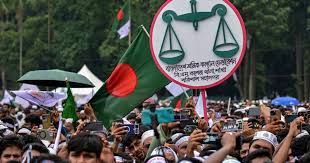
Bangladesh’s Largest Islamist Party Holds Rally Demanding Fair Elections

 :
| Updated On: 21-Jul-2025 @ 11:26 am
:
| Updated On: 21-Jul-2025 @ 11:26 amSHARE
Hundreds of thousands of supporters of Bangladesh’s largest Islamist party, Jamaat-e-Islami, participated in a massive rally in Dhaka, demanding sweeping electoral reforms and the introduction of a proportional representation system. The rally, which marked a significant return to political activity for the party, comes at a time when Bangladesh is preparing for national elections next year amid political uncertainty following the ousting of former Prime Minister Sheikh Hasina.
The gathering in Dhaka’s historic Suhrawardy Udyan, a symbolic site where the Pakistani army surrendered in 1971, was the culmination of a large mobilization effort. Supporters began arriving on Friday and camped overnight at the Dhaka University campus despite the oppressive summer heat. On Saturday, waves of demonstrators marched to the venue, calling for a new political order centered around Islamic governance, justice, and anti-corruption.
Jamaat-e-Islami presented a seven-point demand to the interim government led by Nobel laureate Muhammad Yunus. The demands included ensuring a free, fair, and peaceful election, addressing mass killings from previous years, implementing essential constitutional reforms, and establishing a charter that reflects the mass uprising of the previous year. A central element of their demand was the adoption of a proportional representation electoral system to ensure wider inclusion and fairer results.
Many protesters, including youths in their 20s and 30s, wore T-shirts with the party's logo, headbands, and metallic badges shaped like a scale—the party’s election symbol. Supporters expressed strong ideological commitment, calling for a Bangladesh governed by Islamic principles, with integrity and justice at the forefront. One demonstrator, Iqbal Hossain, declared his willingness to sacrifice his life for the movement’s cause. Another, 20-year-old student Mohidul Morsalin Sayem, emphasized that under Jamaat rule, there would be no discrimination as the party follows the teachings of the Quran.
Party chief Shafiqur Rahman addressed the crowd, framing the upcoming 2024 election as a decisive battle against fascism, corruption, and extortion. He declared that Jamaat would do "whatever is necessary" to win this struggle and build a new future for Bangladesh.
Jamaat-e-Islami has a controversial past. It was banned after Bangladesh’s independence in 1971 due to its support for Pakistan during the war. The party re-emerged in the 1990s, achieving its best electoral performance in 1991 with 18 parliamentary seats. It later joined a coalition government in 2001 but failed to sustain mass support. During Sheikh Hasina's rule from 2009 to 2023, several top Jamaat leaders were executed or imprisoned for war crimes.
After being deregistered for years, Jamaat recently had its political registration reinstated by the Supreme Court, enabling it to participate in the upcoming elections scheduled for April. This decision, along with the rally’s approval, has provoked strong criticism from the exiled Awami League. In a statement on X (formerly Twitter), the party denounced the rally as a betrayal of Bangladesh’s national legacy and a dishonor to the millions who fought for independence in 1971.
Sheikh Hasina, who was overthrown in student-led protests and has lived in exile in India since August last year, faces charges of crimes against humanity. Her party has been banned under the current Yunus-led administration, reshaping Bangladesh’s political landscape ahead of a pivotal election.